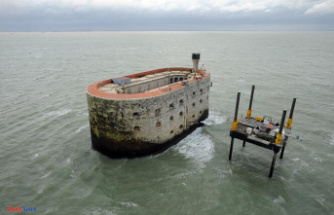FAIRBOURNE , -- Stuart Eves, a 26-year-old Fairbourne resident, decided that the northern Welsh coastal village would be his home when he arrived there 26 years ago. The peaceful pace of small-scale village life in this community with 700 people nestled between rugged mountains and the Irish Sea was what he fell in love.
Eves, 72 years old, built a caravan park in the village to provide a place for his children. He still runs it with his son. "You have the sea and the mountains. It's a beautiful place to live.
This all changed abruptly in 2014 when authorities identified Fairbourne, the first British coastal community to be at high risk from flooding as a result of climate change.
The government predicted that global warming would cause faster sea levels rises and more severe storms. Accordingly, it can only continue to defend the village for 40 years. Fairbourne would not be safe or viable to live in by 2054 according to officials.
Authorities have worked with the villager to carry out the so-called "managed realignment", which basically involves moving them away from the sea and abandoning the village to the sea.
Fairbourne house prices plunged overnight. The residents were called the U.K.’s first "climate refugees" and many were shocked by headlines declaring that their entire village would be "decommissioned." Seventeen years later, most of their concerns about their future are still unanswered.
"They have doomed the village and now they must try to rehome people. Eves, who is chair of the local council, said that there are 450 houses. "If they want to get us out by 2054 then they have to have the accommodation to put them in."
Everyone here doesn't want to go. Many are retired, but there are many young families that are raising their next generation. The tight knit community is proudly celebrated by locals. Although the village center is small and only contains a grocer, fish and chip shop, and a few restaurants, residents claim that the pebbly beaches and steam train attract large crowds in summer.
Natural Resources Wales, the government-sponsored agency responsible for Fairbourne's sea defenses, stated that the village is especially vulnerable due to multiple flooding risks. Fairbourne was built on a low-lying saltmarsh in the 1850s. At high spring tide, Fairbourne is already below sea level. The tidal height is 1.5m (5 feet) higher than the level of Fairbourne during storms.
Scientists estimate that the U.K.'s sea level has risen by 10 centimeters (4 in) over the past century. The predicted rise in sea level is between 70 cm and 1 m depending on the effects of greenhouse gases emissions and government actions.
Fairbourne is also located at the mouth of an estuary with increased risks from flash floods due to the river behind. Officials spent millions on strengthening a seawall and nearly 2 miles of tidal defences.
Flood risks exist in many villages along the Welsh coast. However, it comes down to cost when deciding which areas to protect. Fairbourne officials claim that the cost of flood defenses will be higher than the "value of what we are protecting."
Here are the effects of climate change, which negotiators at United Nations climate summit in Glasgow (Scotland) are trying to reduce.
Catrin Wager is a cabinet member at Gwynedd Council. She oversees Fairbourne. Catrin Wager stressed that Fairbourne might be the first Welsh coast village to be declared unviable because of climate change. She said that there is no precedent in how to help the villagers adapt.
Wager stated, "We need more answers by the Welsh and U.K. government. That's my message going to this (U.N. Summit)." "We need guidance not only on mitigating climate change's effects, but also how to adapt for what is already occurring."
Half a million homes are at risk from coastal flooding in the U.K. according to the Climate Change Committee . This independent advisory body was established under climate change laws.
The U.N. climate summit is being hosted by Britain's government. Richard Dawson, a member and professor of engineering at Newcastle University, stated that Britain needs to be more open about these risks.
He said that "difficult decisions" must be made regarding many coastal settlements, which have disproportionately high levels of elderly and poorer residents. Officials need to prepare the public for moving inland.
Dawson stated that whatever happens at COP, the sea level will continue rising around the U.K., something Dawson stressed. We must be realistic. We cannot afford to protect everyone. Government faces a challenge because the problem isn't being addressed with the urgency and openness we need.
Fairbourne is witness to a constant standoff between officials and villagers. Residents feel unfairly treated and don't believe there is any clear timeline for when sea levels will rise fast enough to threaten their homes. What time and how will evacuations take place? How much will they be paid?
There are no solutions. Ruth Hansford, the vicar of the village, stated that many people suffer from "emotional fatigue" due to years of uncertainty, negativity, and other factors. Others chose to continue living their lives.
Becky Offland recently purchased the GlanY Mor Hotel lease from her husband. This was a bold move against the grain that will help the village's future. They are optimistic that their business will bring Fairbourne more visitors and financial assistance.
It's like a large family. Offland, 36, said that it is not a village. It is a family. "We will all fight to keep this place where it is."
Fairbourne Chippy owner Alan Jones (64), said that he doesn't plan to move anywhere.
He said, "Until water actually gets in here, 'til us physically can't do, we'll continue to,"
Eves stated that he and his son believe "what will happen, will happen." However, he will grieve the inevitable demise of the village he loves.
He said, "You cannot take this village and place it over there and expect it will work again." "What you have is a human catastrophe on a small scale."












